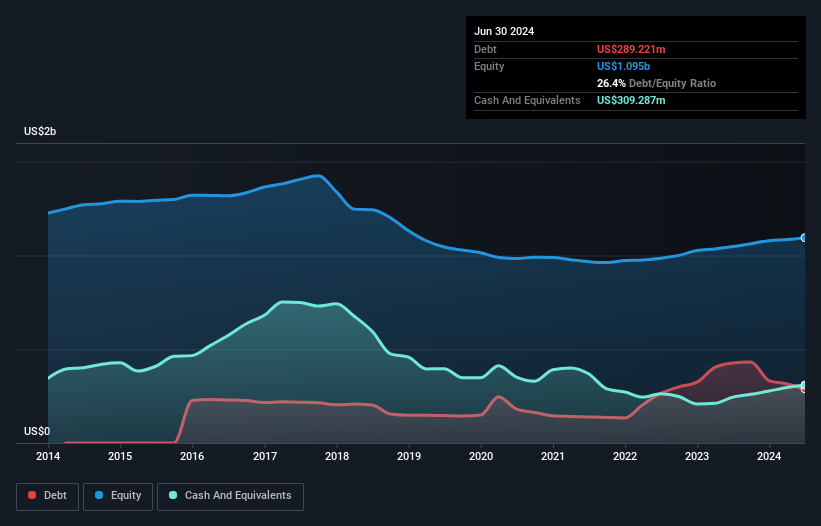Benchmark Electronics (NYSE:BHE) Seems To Use Debt Quite Sensibly
David Iben put it well when he said, 'Volatility is not a risk we care about. What we care about is avoiding the permanent loss of capital.' It's only natural to consider a company's balance sheet when you examine how risky it is, since debt is often involved when a business collapses. We can see that Benchmark Electronics, Inc. (NYSE:BHE) does use debt in its business. But is this debt a concern to shareholders?
What Risk Does Debt Bring?
Debt assists a business until the business has trouble paying it off, either with new capital or with free cash flow. If things get really bad, the lenders can take control of the business. However, a more frequent (but still costly) occurrence is where a company must issue shares at bargain-basement prices, permanently diluting shareholders, just to shore up its balance sheet. Of course, debt can be an important tool in businesses, particularly capital heavy businesses. When we examine debt levels, we first consider both cash and debt levels, together.
Check out our latest analysis for Benchmark Electronics
What Is Benchmark Electronics's Net Debt?
You can click the graphic below for the historical numbers, but it shows that Benchmark Electronics had US$289.2m of debt in June 2024, down from US$427.0m, one year before. But on the other hand it also has US$309.3m in cash, leading to a US$20.1m net cash position.

How Strong Is Benchmark Electronics' Balance Sheet?
Zooming in on the latest balance sheet data, we can see that Benchmark Electronics had liabilities of US$643.1m due within 12 months and liabilities of US$416.6m due beyond that. On the other hand, it had cash of US$309.3m and US$558.7m worth of receivables due within a year. So its liabilities outweigh the sum of its cash and (near-term) receivables by US$191.7m.
Given Benchmark Electronics has a market capitalization of US$1.59b, it's hard to believe these liabilities pose much threat. But there are sufficient liabilities that we would certainly recommend shareholders continue to monitor the balance sheet, going forward. Despite its noteworthy liabilities, Benchmark Electronics boasts net cash, so it's fair to say it does not have a heavy debt load!
One way Benchmark Electronics could vanquish its debt would be if it stops borrowing more but continues to grow EBIT at around 13%, as it did over the last year. The balance sheet is clearly the area to focus on when you are analysing debt. But ultimately the future profitability of the business will decide if Benchmark Electronics can strengthen its balance sheet over time. So if you want to see what the professionals think, you might find this free report on analyst profit forecasts to be interesting.
Finally, a business needs free cash flow to pay off debt; accounting profits just don't cut it. While Benchmark Electronics has net cash on its balance sheet, it's still worth taking a look at its ability to convert earnings before interest and tax (EBIT) to free cash flow, to help us understand how quickly it is building (or eroding) that cash balance. Over the last three years, Benchmark Electronics saw substantial negative free cash flow, in total. While investors are no doubt expecting a reversal of that situation in due course, it clearly does mean its use of debt is more risky.
Summing Up
While Benchmark Electronics does have more liabilities than liquid assets, it also has net cash of US$20.1m. And it also grew its EBIT by 13% over the last year. So we are not troubled with Benchmark Electronics's debt use. The balance sheet is clearly the area to focus on when you are analysing debt. But ultimately, every company can contain risks that exist outside of the balance sheet. For example - Benchmark Electronics has 2 warning signs we think you should be aware of.
Of course, if you're the type of investor who prefers buying stocks without the burden of debt, then don't hesitate to discover our exclusive list of net cash growth stocks, today.
Have feedback on this article? Concerned about the content? Get in touch with us directly. Alternatively, email editorial-team (at) simplywallst.com.
This article by Simply Wall St is general in nature. We provide commentary based on historical data and analyst forecasts only using an unbiased methodology and our articles are not intended to be financial advice. It does not constitute a recommendation to buy or sell any stock, and does not take account of your objectives, or your financial situation. We aim to bring you long-term focused analysis driven by fundamental data. Note that our analysis may not factor in the latest price-sensitive company announcements or qualitative material. Simply Wall St has no position in any stocks mentioned.
 Index Options
Index Options CME Group
CME Group Nasdaq
Nasdaq Cboe
Cboe TradingView
TradingView Wall Street Journal
Wall Street Journal